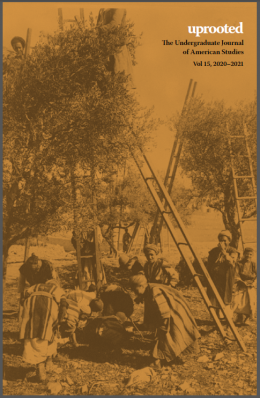
register for this event from here
Recent political debates have focused on the role of physical infrastructure as a key driver of growth, stability and an equitable society in America for this generation and those to come. Infrastructure in the American context includes roads, bridges, telecommunication systems, electrical grids and vital public health interventions such as water pipe construction. This event will draw on themes from the disciplines of history, sociology, economics and media studies to explore the origins and evolution of American infrastructure and its impacts on the development of American society and especially persistent racial and ethnic inequities.
— Program —
10:30am Coffee and Pastries
11:10am – 11:55am Edson Severnini – “The U.S. Electricity Infrastructure over the 20th Century (and Beyond): Benefits and Costs”
12:00pm – 2:00pm Break
2:10pm – 2:55pm Isaiah Ellis – “Masters of Sentiment: Race, Expertise, and Empire in Southern Roadbuilding”
2:55pm – 3:10pm Break
3:10pm – 3:55pm Orit Halpern – “The Planetary Test”
3:55pm – 4:10pm Break
4:10pm – 5:40pm Keynote Lecture Yuri Furuhata – “Into the Clouds: Atlases of Anthropogenic Weather”
5:40pm Adjourn
— Speaker Bios —
Isaiah Ellis
Isaiah Ellis is an Arts & Sciences Postdoctoral Fellow at the University of Toronto.
Yuriko Furuhata
Yuriko Furuhata is Associate Professor and William Dawson Scholar of Cinema and Media History in the Department of East Asian Studies and an associate member of the Department of Art History and Communication Studies at McGill University. Her first book, Cinema of Actuality: Japanese Avant-Garde Filmmaking in the Season of Image Politics (Duke University Press, 2013), won the Best First Book Award from the Society of Cinema and Media Studies. Her second book, entitled Climatic Media: Transpacific Experiments in Atmospheric Control (Duke University Press, 2022) explores the geopolitical conditions underpinning environmental art, weather control, digital computing, and cybernetic architecture in Japan and the United States. She is currently working on a new book project, titled The Edges of Deep Time: Archipelagic Archives of the Anthropocene, which explores scientific photographs and films of fossils, clouds, snow and ice in relation to the settler colonial histories of geosciences in Japan and North America.
Orit Halpern
Orit Halpern is Full Professor and Chair of Digital Cultures and Societal Change at Technische Universität Dresden. Her work bridges the histories of science, computing, and cybernetics with design. She completed her Ph.D. at Harvard. She has held numerous visiting scholar positions including at the Max Planck Institute for the History of Science in Berlin, IKKM Weimar, and at Duke University. She is currently working on two projects. The first is a history of automation, intelligence, and freedom; the second project examines extreme infrastructures and the history of experimentation at planetary scales in design, science, and engineering.
She has also published widely in many venues including Critical Inquiry, Grey Room, and Journal of Visual Culture, and E-Flux. Her first book Beautiful Date: A History of Vision and Reason (Duke UP 2015) investigates histories of big data, design, and governmentality. Her current book with Robert Mitchell (forthcoming MIT Press December 2022) is titled the Smartness Mandate. The book is a genealogy of our current obsession with smart technologies and artificial intelligence. She also directs two design history and practice research platforms Governing Through Design and Against Catastrophe.
Edson Severnini
I’m an Associate Professor of Economics and Public Policy (without tenure) at Carnegie Mellon University (Heinz College), a Faculty Research Fellow at the National Bureau of Economic Research (NBER), and a Research Affiliate at the Institute of Labor Economics (IZA). My research interests lie at the intersection of Energy and Environmental Economics, Economic History, and Labor Economics. My work focuses on examining the impacts of the expansion of energy access, pollution, and environmental regulation on local development, health outcomes, and firm behavior since the age of electrification in the United States. I am also interested on the impact of climate change on air pollution, electricity generation, and infectious disease, and on racial issues in local labor markets and in higher education. I’m a proud first-generation college student, immigrant, and queer. My pronouns are he/him/his.

